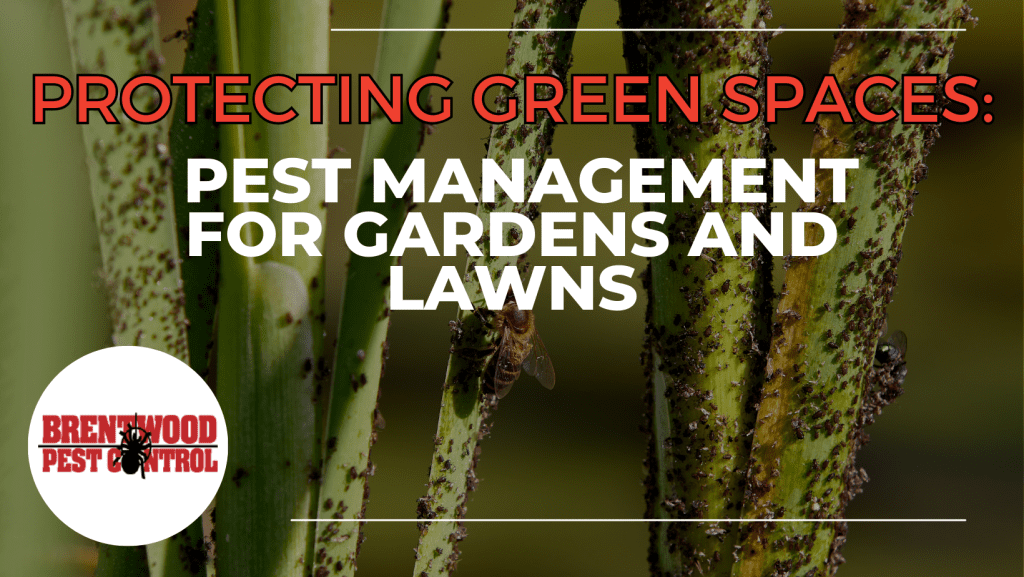
Safeguarding Brentwood’s Green Spaces: Expert Tips for Pest Management in Gardens and Lawns
Maintaining a lush and thriving garden in Brentwood is a rewarding endeavor, but it comes with its fair share of challenges, especially when it comes to pests that can threaten the health of your plants and the comfort of your home. Brentwood Pest Control is here to provide you with expert advice on protecting your green spaces from harmful pests. From identifying beneficial insects to offering natural pest control solutions and knowing when to call in the experts, we’ve got you covered. Read on to discover how you can enjoy a pest-free garden and lawn while preserving Brentwood’s beautiful landscapes.
Understanding Garden Insects:
Before diving into pest control strategies, it’s essential to distinguish between beneficial and harmful insects in your garden.
Beneficial Insects:
1. Ladybugs, Butterflies, and Honeybees: These pollinators play a crucial role in the flourishing of your flowers, fruits, and vegetables.
2. Praying Mantises and Spiders: These predators help control harmful pests by preying on insects that can harm your garden.
3. Ground Beetles and Earthworms: They contribute to a healthy garden ecosystem by aerating the soil and controlling pests.
4. Carpenter Bees: While they may seem harmful, they play a role in pollination and rarely cause significant damage.
Harmful Insects:
1. Aphids, Chinch Bugs, Cutworms, Mole Crickets, Stink Bugs, and Spittlebugs: These pests feed on plants and grass, posing a threat to your garden and lawn.
2. Bed Bugs, Cockroaches, Ants, and Termites: Home-invading pests can spread diseases and cause structural damage.
Natural Pest Control in Your Garden:
1. Choose Disease-Resistant Plants: Opt for plants and seeds that are naturally resistant to diseases and pests, providing your garden with a strong line of defense.
2. Maintain a Clean Yard: Regularly remove weeds, debris, and dead plants to eliminate hiding spots for pests and create an environment that discourages their presence.
3. Introduce Beneficial Insects: Release ladybugs into your garden to control aphids and mites. These natural predators can significantly reduce harmful pest populations.
4. Plant Pest-Repelling Herbs: Include strong-scented plants like garlic, calendula, chives, and thyme in your garden to naturally repel pests.
5. Create a Habitat for Beneficial Insects: Designate areas in your garden for beneficial insects to lay their eggs and thrive, promoting a balanced ecosystem.
Identifying Pest Infestations:
Recognizing signs of pest infestations early on is crucial for effective pest management. Look out for:
1. Damaged Leaves: Holes or jagged edges on leaves may indicate the presence of pests feeding on your plants.
2. Shredded Paper or Sawdust: Indicative of wood-boring insects like termites or carpenter ants, posing a threat to wooden structures.
3. Unusual Bumps: Small round or elongated bumps may be egg sacs of pests, requiring attention.
4. Spider Webs: Presence of spider webs in and around your home may signal an existing pest problem.
5. Unpleasant Odors: Musky or ammonia smells could indicate a serious pest infestation, requiring immediate action.
When to Seek Professional Help:
While many pest issues can be managed with DIY methods, there are instances where professional intervention is necessary:
1. Visible Feces or Waste Piles: Clear indicators of an infestation, requiring immediate attention from pest control experts.
2. Bed Bug Infestations: These pests are challenging to eliminate without professional assistance.
3. Large Pests Like Raccoons or Bats: Trapping and safely removing larger pests should be handled by professionals to avoid risks.
4. Termite Swarms: Swift action by experts is essential to prevent severe structural damage to your home.
5. Persistent Pest Problems: If your attempts at pest-proofing and control prove ineffective, it’s time to consult professionals for a thorough solution.
Maintaining a Pest-Free Lawn:
To ensure your lawn remains pest-free, consider these additional tips:
1. Thorough Lawn Clean-Up: Regularly rake and remove leaves, weed your gardens, and pick up debris to eliminate attractive hiding spots for pests.
2. Trim Trees and Shrubs: Prune branches and shrubs away from your home to prevent pests from using them as entry points.
3. Store Firewood Away: Keep firewood at least 30 feet away from your home, as it can attract rodents and termites.
4. Inspect and Seal Cracks: Regularly inspect and seal cracks and crevices around your home’s exterior to prevent pest entry.
Maintaining pest-free gardens and lawns in Brentwood requires a combination of preventive measures, natural control methods, and, when necessary, professional intervention. By following these expert tips, you can safeguard your green spaces, enjoy the beauty of your garden, and contribute to preserving Brentwood’s stunning landscapes. For personalized advice and professional pest control services, visit our website or call (615) 417-1243. Let’s work together to keep Brentwood’s green spaces thriving and free from harmful pests.
